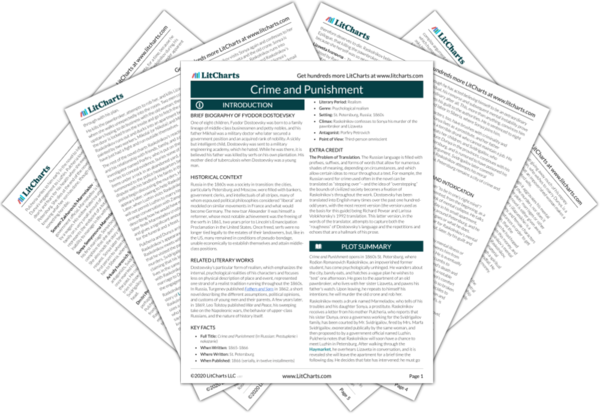Summary
Analysis
Raskolnikov heads to Sonya’s apartment, in the home of Kapernaumov the tailor. He knocks and she allows him to enter. The room is spare and barely furnished. Raskolnikov says he has come to her for the last time; Sonya asks whether he will not be at her father’s funeral tomorrow. Raskolnikov remarks on the thinness of Sonya’s fingers, and Sonya says she thought she saw an image of her father earlier in the day.
Until now, Raskolnikov has not had a moment of intimate conversation with Sonya. He looks upon her as with fresh eyes: he sees her beauty, and the squalor in which she has been forced to live. Raskolnikov wishes to speak with her, but also fears this newfound intimacy, and says he will not return to her after today.
Themes
When Raskolnikov accuses Katerina of having beaten Sonya, Sonya says that she loves her stepmother and recognizes that she, Sonya, must work now to protect the family. Sonya reports that Katerina has begun believing in her fantasies—that she can throw a large funeral banquet for Marmeladov being among them. Sonya pities her stepmother and asks Raskolnikov to do the same. She lets slip that she knew Lizaveta, sister to the pawnbroker; Raskolnikov seizes upon this fact.
Sonya’s loyalty to her family is notable. Even though Katerina has more or less forced Sonya into becoming a prostitute in order to support the family, Sonya does not hold this against her stepmother, and she worries, in fact, that Katerina might be going insane, and that no one is present to support Katerina herself.
Themes
Raskolnikov tells Sonya that consumption will eventually kill Katerina, and that Polenka might also be forced into prostitution to support the family. When Sonya says God will not allow such a thing, Raskolnikov asks whether God really exists. Raskolnikov says it is most pitiful that Sonya has degraded herself for no end, since her earnings as a prostitute cannot support her family, nor prevent Polenka from succumbing to the same.
Raskolnikov’s nihilism is on full display in this scene. His belief that perhaps God does not exist, and that Sonya’s belief in God is therefore in vain, resonates with a central tenet of nihilism: that all aspects of organized society, including religion, are shams designed to lull humankind into a false sense of security. Raskolnikov believes the world to be far more vicious, and far less easily explained by Christian teachings, than Sonya does.
Themes
Raskolnikov thinks to himself that Sonya has only three options: to kill herself, to go insane, or to “descend into depravity.” He asks if Sonya prays, and she responds that she is “nothing without God.” Raskolnikov picks up the New Testament and asks Sonya to read to him the section in John of Jesus raising Lazarus from the dead. She hesitates, afraid of Raskolnikov, but begins to read.
Another reference to the story of Lazarus. In this scene, one of the novel’s most important, Raskolnikov appears to ask Sonya to reacquaint him with religious teachings, even though Raskolnikov claims not to believe in God.
Themes
Get the entire Crime and Punishment LitChart as a printable PDF.

In the story of Lazarus, Jesus arrives in a town and is asked why he did not save Lazarus, who has recently died. Jesus asks God to demonstrate to the people that he has in fact come for their salvation. God grants him the power to raise Lazarus, though the man has been dead four days. At this point the Jews assembled believe that Jesus is the son of God. Sonya trembles upon finishing, and Raskolnikov tells her that today he left his mother and sister.
The story of Lazarus presents an interesting wrinkle in the larger story of Jesus’ ministry. Although Jesus has already performed miracles throughout Judea, there are still many who do not believe he is the son of God. Jesus must ask his father for permission to raise Lazarus from the dead, in order to present irrefutable evidence of messianic qualities. Jesus literally rewrites the laws of nature—proves himself to be an "extraordinary" man—and yet he does so not by killing (as Raskolnikov did) but by reversing death. In this way the story of Lazarus is a profound rebuke to Raskolnikov, proving both Raskolnikov's ordinariness and also his misunderstanding of what makes one extraordinary.
Themes
Raskolnikov tells her, too, that they are on “the same path,” and that they must have “freedom . . . freedom and power.” Sonya is frightened. Raskolnikov promises that, if he returns tomorrow, he will do so to tell Sonya who killed Lizaveta. Sonya falls into a fever and worries for the remainder of the night. Meanwhile, Svidrigailov has been standing behind a adjoining wall in the apartment next door the whole time, and has heard their conversation. He plans to bring a seat the next time to listen to what Raskolnikov reveals.
Svidrigailov is yet another character who has hidden himself in order to perceive what is on the other side of a door or wall. In this case, he has overhead this first conversation by accident. But as it turns out, coincidentally, Raskolnikov is to return the next day in order to tell Sonya who has killed Lizaveta. Raskolnikov’s ultimate confession is now within sight.
Themes












